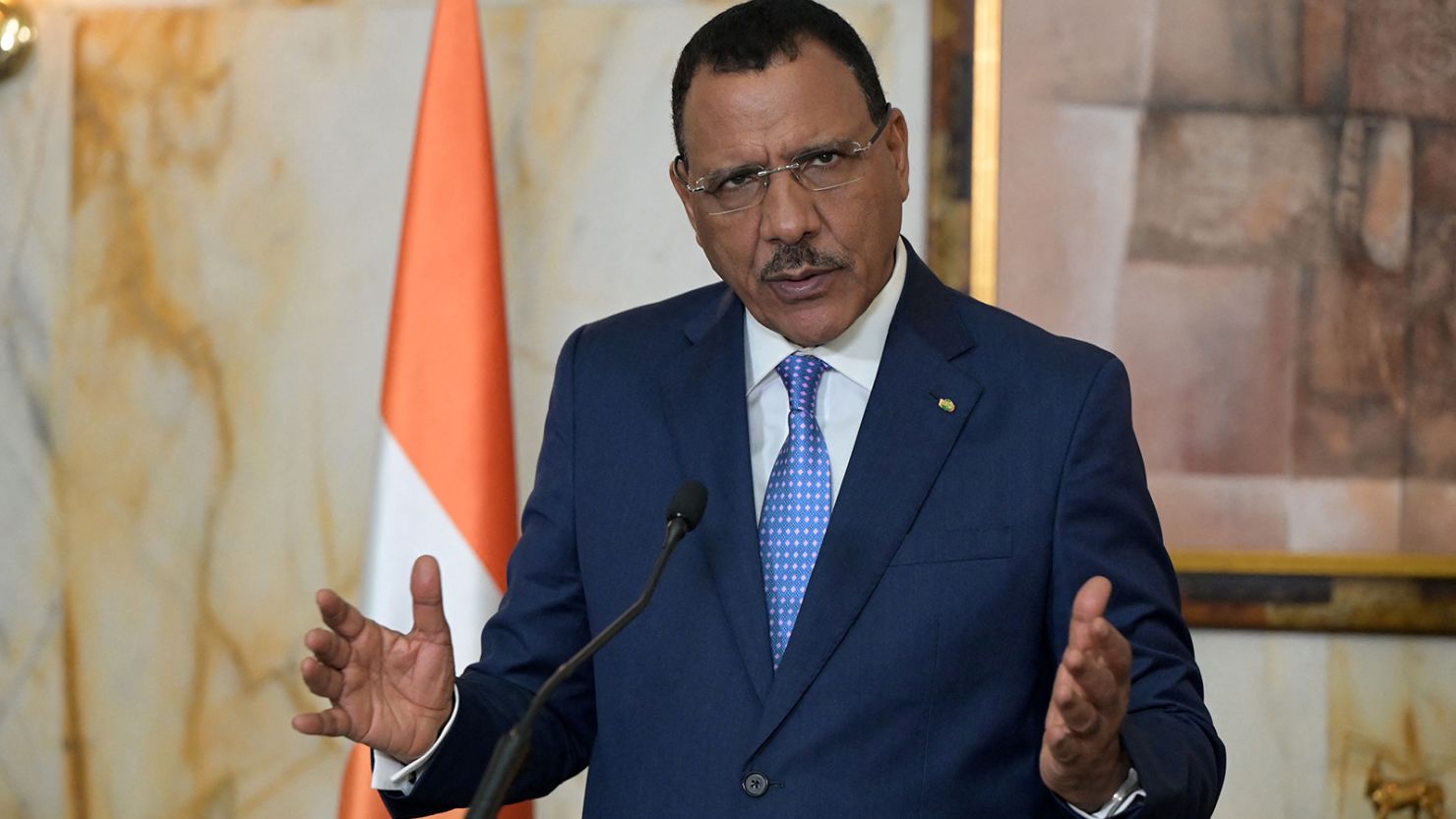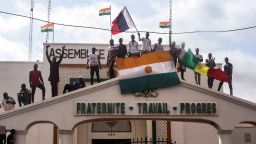Niger’s junta claimed Sunday it had gathered evidence to prosecute the country’s ousted President Mohamed Bazoum for “high treason,” upping the stakes in their brinkmanship against key neighbors in West Africa who have vowed to restore constitutional order in the coup-hit country.
“The Nigerien government has to date, gathered the necessary evidence to prosecute the deposed president and his local and foreign accomplices before the competent national and international authorities for high treason and undermining internal and external security of Niger,” said a statement by the National Council for the Safeguard of the Homeland (CNSP) of Niger, the military council that toppled the government in July.
Niger has been engulfed in political chaos since late last month, when Bazoum was ousted in a coup d’etat by the presidential guard. The July putsch sparked international condemnation and renewed uncertainty in a volatile part of Africa, beset by coups and militant extremism.
Niger, which lies at the heart of the Sahel, was one of the few remaining democracies in the region.
Bazoum’s election win in 2021 marked a relatively peaceful transfer of power and capped years of military coups following Niger’s independence from France in 1960.
Leaders from the Economic Community of West African States (ECOWAS) responded to the coup by enacting sanctions and issuing an ultimatum to the ruling military junta: stand down within a week or face a potential military intervention.
But Mali, Burkina Faso and Guinea, three other West African nations that have all recently experienced military coups, have expressed solidarity with Niger’s junta, raising the specter of the tussle becoming a regional crisis.
Diplomatic efforts appeared to have stalled, but on Sunday the Nigerien junta told a Nigerian delegation that it is willing to meet with ECOWAS representatives, and delegation member Sheikh Abdullahi Bala Lau said that “fruitful deliberations” had taken place.
“We created an avenue whereby the ECOWAS leaders and the leader of Niger now, General Tiani and his team have a place either here in Nigeria or in any place in West Africa for them to sit and discuss,” Bala Lau said.
“We don’t want war, or military force to take place between Niger. We are neighbors,” he added.
Ali Mahaman Lamine Zeine, who was appointed by Niger’s military junta to be prime minister, also commented on the visit, which he said “comforted” the Nigerien authorities.
Zeine told German media outlet Deutsche Welle (DW) that the delegation included ulemas, who are regarded as highly respected scholars and constitute “the voice of a segment of Nigerian society.”
Nigerian parliamentarians have also voiced their disapproval of any military intervention in Niger, said Zeine.
In Sunday’s interview Zeine also said Niger will overcome the sanctions imposed by ECOWAS.
“We think that even if it’s an unfair challenge that’s been imposed on us, we should be able to get together to overcome it, and we will,” he said.
Bazoum has accused the junta of depriving him of “all human contact” and failing to supply him medicine or food.
In its statement, the CNSP denied those accusations, saying the ousted leader regularly receives visits from his doctor – the most recent of which was on Saturday.
The doctor did not raise any problem as to Bazoum’s state of health, the statement claimed.
Increasing pressure
West African leaders have ramped up rhetoric against Niger’s coup leaders and ordered the “activation and deployment” of a regional standby force to restore constitutional order in the country.
ECOWAS, a regional political and economic union, said that it had formed a parliamentary committee it aims to send to Niger to meet with coup leaders, a source told CNN on Sunday.
The source also said committee members would first meet among themselves via Zoom on Monday but did not make clear when they would meet with coup leaders. The parliamentary committee was made up of 12 members and chaired by Nigerian first deputy speaker of ECOWAS’ parliament, Ahmed Idris Wase, the source added.
ECOWAS previously gave coup leaders the deadline of August 6 to release and reinstate Bazoum as president and cede power or face possible military action as a last resort.
On Wednesday, ECOWAS said a separate joint mission with the United Nations and African Union to meet with the Nigerien military junta on Tuesday “was aborted” after the military authorities in Niamey communicated “their unavailability to receive the tripartite delegation.”
Meanwhile self-proclaimed Niger defense chief Gen. Moussa Salaou Barmou met with Guinea’s junta leader and transitional president Mamadi Doumbouya in Guinea’s capital Conakry. Guinea underwent its own military coup in 2021.
“We are pan-African … we will always be there,” Doumbouya said during the meeting on Saturday.
Niger’s new military leader, Gen. Abdourahamane Tchiani, has also asked Mali for support despite its considerably reduced military capacity.
CNN’s Martin Goillandeau contributed to this report.




